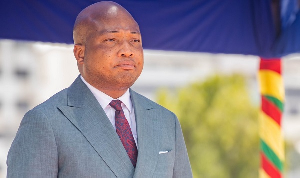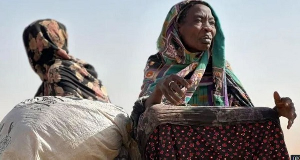A GNA Feature by Maxwell Awumah
Ho, Sept. 22 GNA - This year's yam festival of the Chiefs and people of Asogli State, under the distinguished patronage of Togbe Afede XIV, the Agbogbomefia commenced from Friday September 15 and would end on Sunday October 3.
The festival, which seeks to highlight unity, reconciliation, stocktaking and development as well as platform for the annual re-union with the ancestors and the re-affirmation of allegiance by all Chiefs and their subjects in the Asogli State to the Agbogbome Stool, also marks the first anniversary celebration of the enstoolment of the Agbogbomefia.
The festival under the theme, "Peace, Unity and Development Towards a Better Future", is multi-faceted in character as merry-making would be interspersed with the quest for socio-economic development of the area and the region as a whole.
This year's activities which is unprecedented in the annals of the festival in the area would witness the laying of a foundation stone for a smooth economic buoyancy including the hosting of the Volta Congress, an initiative of the Asogli State Council (ASC) and the Volta Forum Trust (VFT) which is a World Bank supported strategic conference. It would bring together all key stakeholders in the Region's socio-economic agenda, towards setting the stage for development and implementation of the region's development master-plan to complement government's development efforts in the region.
The highpoint of the Congress would be the launching of two key initiatives, a 10-billion cedi Volta Development Fund (VDF) to support the development of the region's socio-economic infrastructure and a 20-million dollar Volta Venture Capital Fund (VVCF) also to support the development of small and medium size enterprises.
Subsequently, a sod-cutting ceremony for the construction of a ultra-modern palace would take place with the launching of the Asogli State Flag and a website.
THE ORIGIN OF YAM CULTIVATION AND FESTIVAL
Yam, known in Ewe as 'ete', literally means swollen, according to oral history was discovered by a hunter in the forest during a famine period but selfishly hid the tuber in the soil for use some other time but surprisingly the tuber germinated and grew bigger when he finally went for it. He later made the discovery public setting the stage for the cultivation of the yam.
The festival was brought down by the Ewes from Notsie in the Republic of Togo where they migrated from to their present abode in Ghana. History has it that the cultivation of yam was considered very tedious and some of those people who ventured into the enterprise did not leave to enjoy their labour. Its cultivation is still labour intensive, energy sapping and quite hazardous, hence the proverb, "Ne eteti tsogbe wodua ete la, egbor makpor tsroa ha du o", literally means "if it were during the day of planting yam that it is eaten, the goat will never taste the peel".
Diligence was therefore required and the guidance and the protection of the gods of the land and ancestors were sought throughout the entire period of planting through to harvesting.
During harvest time which is normally in September, the gods and ancestors were served first with the boiled and mashed yam called 'bakabake' before any living being tasted it. The rest of the meal is eaten as a communal meal signifying unity, reconciliation and prosperity. This rite is called 'dzawuwu'.
The Hailing of the new yam known as 'teyuyru' symbolises the official lifting of the ban on the entry into town of the new yam amidst drumming and merry-making by both the young and the elderly.
OBJECTIVES OF THE FESTIVAL
* As thanksgiving to Almighty God and also gods and ancestors for a bumper harvest and to offer prayers for good health and prosperity
* To foster unity through forgiveness and reconciliation
* As an annual stocktaking
* To mobilise both human and material resources of Asogli State for job and wealth creation
* To re-affirm allegiance of all Chiefs and their subjects in the Asogli State to the Agbogbome Stool
Some highlights of the festival include mini-durbars at Akoefe, Kpenoe and Takla and a grand durbar of Chiefs and people of Asogli State on Saturday October 2 and later that evening a State Dance. A non-denominational thanksgiving service would climax the two week festivities.
Opinions of Wednesday, 22 September 2004
Columnist: GNA














